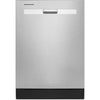Softened Water Benefit Study (aka) The Battelle Study
Do you know the impacts of hard and soft water? Here are the facts based on a Water Quality Softened Water Benefit Study:
Gas Storage Tank Water Heaters:
■ With softened water – Gas storage tank household water heaters operated on softened water maintained the original factory efficiency rating over a 15-year lifetime.
■ With hard water – Hard water can lead to as much as a 24% loss of efficiency in water heaters.
• Each 5 grains per gallon of water hardness causes a 4% loss in efficiency and 4% increase in cost for gas storage tank water heaters when using 50 gallons of hot water per day. (On 30 gpg hard water, that’s 24% less efficient than with softened water.)
Tankless Heaters:
■ The economic savings of softened water with instantaneous tankless water heaters can lead to recovery of the cost of a water softener and operating supplies in a period as short as a year, if the incoming water is sufficiently hard.
■ With softened water – Indoor instantaneous gas water heaters (tankless heaters) operated on softened water maintained the original factory efficiency rating over a 15-year lifetime.
■ With hard water –
• The study found that tankless water heaters completely failed to function because of scale plugging in the downstream plumbing after only 1.6 years of equivalent hot water use on 26 gpg hard water.
• Softened water saves 40% of costs compared to operating on 20 gpg and saves 57% compared to operation on 30 gpg hard water.
Electric Water Heaters:
■ Up to 30 pounds calcium carbonate rocklike scale deposits can accumulate in electric water heaters.
■ Each 5 gpg of water hardness caused 0.4 pounds of scale accumulation each year in electric storage tank household water heaters.
■ “the life of the heating element can be expected to shorten due to scale buildup increasing the operating temperature of the element” in the electric storage water heaters operating on unsoftened water, says Battelle
Memorial Institute.
Carbon Footprint:
■ The carbon footprint increases 18% for gas storage tank water heaters when operated on 26 gpg hard water for 15 years as compared to the same operation on 0 gpg softened water.
■ For instantaneous-type natural gas water heaters, this same carbon footprint increases 4% when operated on 26 gpg hard water versus 0 gpg softened water over 15 years.
Showerheads and Fixtures:
■ With softened water – Showerheads on soft water maintained a brilliant luster and full flow. Faucets on softened water performed well throughout the study; nearly as well as the day they were installed.
■ With hard water – Showerheads on hard water lost 75% of the flow rate in less than 18 months.
• Faucets on hard water could not maintain the specified 1.25 gallons per minute flow rate because of scale collection of the strainers. The strainers on the faucets using unsoftened water were almost completely plugged after 19 equivalent days of testing.

